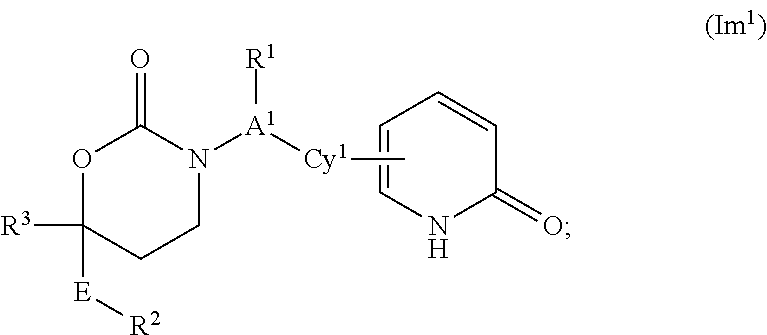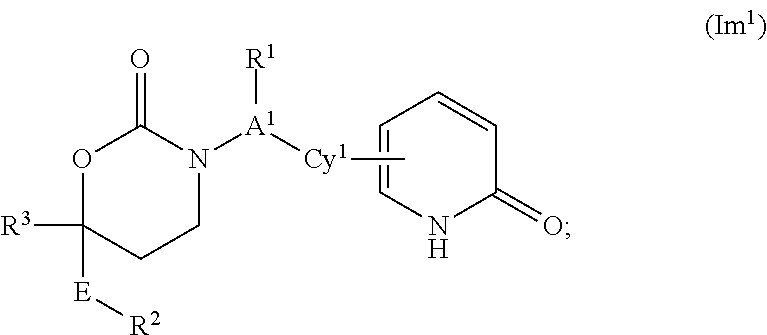Cyclic inhibitors of 11beta-hydroxysteroid dehydrogenase 1
a technology of hydroxysteroid dehydrogenase and cyclic inhibitors, which is applied in the direction of drug compositions, metabolic disorders, immunological disorders, etc., can solve the problems of impaired glucose tolerance and/or type 2 diabetes, adverse effects on skeletal tissues, and loss of partial visual field and eventually blindness,
- Summary
- Abstract
- Description
- Claims
- Application Information
AI Technical Summary
Benefits of technology
Problems solved by technology
Method used
Image
Examples
preparation 1
(S)-3-((S)-1-(4-bromophenyl)ethyl)-6-(2-hydroxy-2-methylpropyl)-6-phenyl-1,3-oxazinan-2-one
Method 1
[0227]
Step 1: (S)-1-bromo-4-(1-isocyanatoethyl)benzene
[0228]To a solution of (S)-1-(4-bromophenyl)ethanamine (240 g, 1.2 mol) in methylene chloride (3 L) and satd aq NaHCO3 (3 L) solution was added triphosgene (118 g, 0.396 mol) at 0° C. The mixture was stirred for 15 min. The organic phase was separated, dried over Na2SO4 and concentrated to give 1-bromo-4-(1-isocyanato-ethyl)-benzene (170 g, 63%).
Step 2: 1-chloro-3-phenylhex-5-en-3-ol
[0229]To a solution of 3-chloro-1-phenylpropan-1-one (170 g, 1.01 mol) in anhydrous THF (1200 mL) was added allylmagnesium bromide (1.2 L, 1 mol / L) at −78° C. under nitrogen. The formed mixture was stirred for 30 min at −78° C. The reaction was quenched with aqueous NaHCO3 solution. The organic phase was separated, dried over Na2SO4 and concentrated to give the crude product, which was purified by column chromatography (petroleum ether / EtOAc=100:1) to af...
preparation 2
(S)-6-(2-hydroxy-2-methylpropyl)-6-phenyl-3-((S)-1-(4-(4,4,5,5-tetramethyl-1,3,2-dioxaborol-an-2-yl)phenyl)ethyl)-1,3-oxazinan-2-one
[0246]
[0247]To a solution of (S)-3-((S)-1-(4-bromophenyl)ethyl)-6-(2-hydroxy-2-methylpropyl)-6-phenyl-1,3-oxazinan-2-one (6.6 g, 15.2 mmol) and 4,4,4′,4′,5,5,5′,5′-octamethyl-2,2′-bi(1,3,2-dioxaborolane) (6.1 g, 24.3 mmol) in dry DMSO (20 mL) was added KOAc (4.8 g, 48.6 mmol) and Pd(dppf)cl2 (372 mg, 0.46 mmol). After addition, the mixture was allowed to warm to 100° C. for 20 h. After TLC showed the starting material had disappeared, the solid was filtered off. Water (60 mL) and EtOAc (20 mL) were added. The layers were separated and the aqueous layer was extracted with EtOAc (3×15 mL). The combined organic layer was washed with brine, dried over Na2SO4, filtered and concentrated to give a residue, which was purified by column chromatography to give (S)-6-(2-hydroxy-2-methylpropyl)-6-phenyl-3-((S)-1-(4-(4,4,5,5-tetramethyl-1,3,2-dioxaborol-an-2-yl)phen...
preparation 3
3-((R)-3-((S)-1-(4-bromophenyl)ethyl)-2-oxo-6-phenyl-1,3-oxazinan-6-yl)-2,2-dimethylpropanenitrile
[0251]
Preparation of Cobalt(II) Complex
[0252]A 50 mL flask was charged with N,N′-bis(3,5-di-tert-butylsalicylidene)-1,1,2,2-tetramethylethenediamine (0.430 g, 0.78 mmol, 1.0 equiv), EtOH (17 mL), and Co(OAc)2 (0.139 g, 0.78 mmol, 1.0 equiv). The mixture was degassed and then heated to reflux under nitrogen for 3 h, cooled to room temperature. The precipitate was filtered and the purple solid was washed with EtOH (10 mL) and dried under high vacuum to give 0.353 g (75%) of the cobalt(II) complex.
[0253]A mixture of (R)-3-((S)-1-(4-bromophenyl)ethyl)-6-(2-methylallyl)-6-phenyl-1,3-oxazinan-2-one (490 mg, 1.18 mmol), the cobalt(II) complex whose preparation is described immediately above (8 mg, 0.01 equiv), TsCN (257 mg, 1.2 equiv), and PhSiH3 (137 mg, 157 μL, 1.07 equiv) in ethanol (10 mL) was stirred 4 h at rt. After removing the solvent under reduced pressure, the residue was purified by...
PUM
| Property | Measurement | Unit |
|---|---|---|
| temperature | aaaaa | aaaaa |
| temperature | aaaaa | aaaaa |
| temperature | aaaaa | aaaaa |
Abstract
Description
Claims
Application Information
 Login to View More
Login to View More - R&D
- Intellectual Property
- Life Sciences
- Materials
- Tech Scout
- Unparalleled Data Quality
- Higher Quality Content
- 60% Fewer Hallucinations
Browse by: Latest US Patents, China's latest patents, Technical Efficacy Thesaurus, Application Domain, Technology Topic, Popular Technical Reports.
© 2025 PatSnap. All rights reserved.Legal|Privacy policy|Modern Slavery Act Transparency Statement|Sitemap|About US| Contact US: help@patsnap.com



